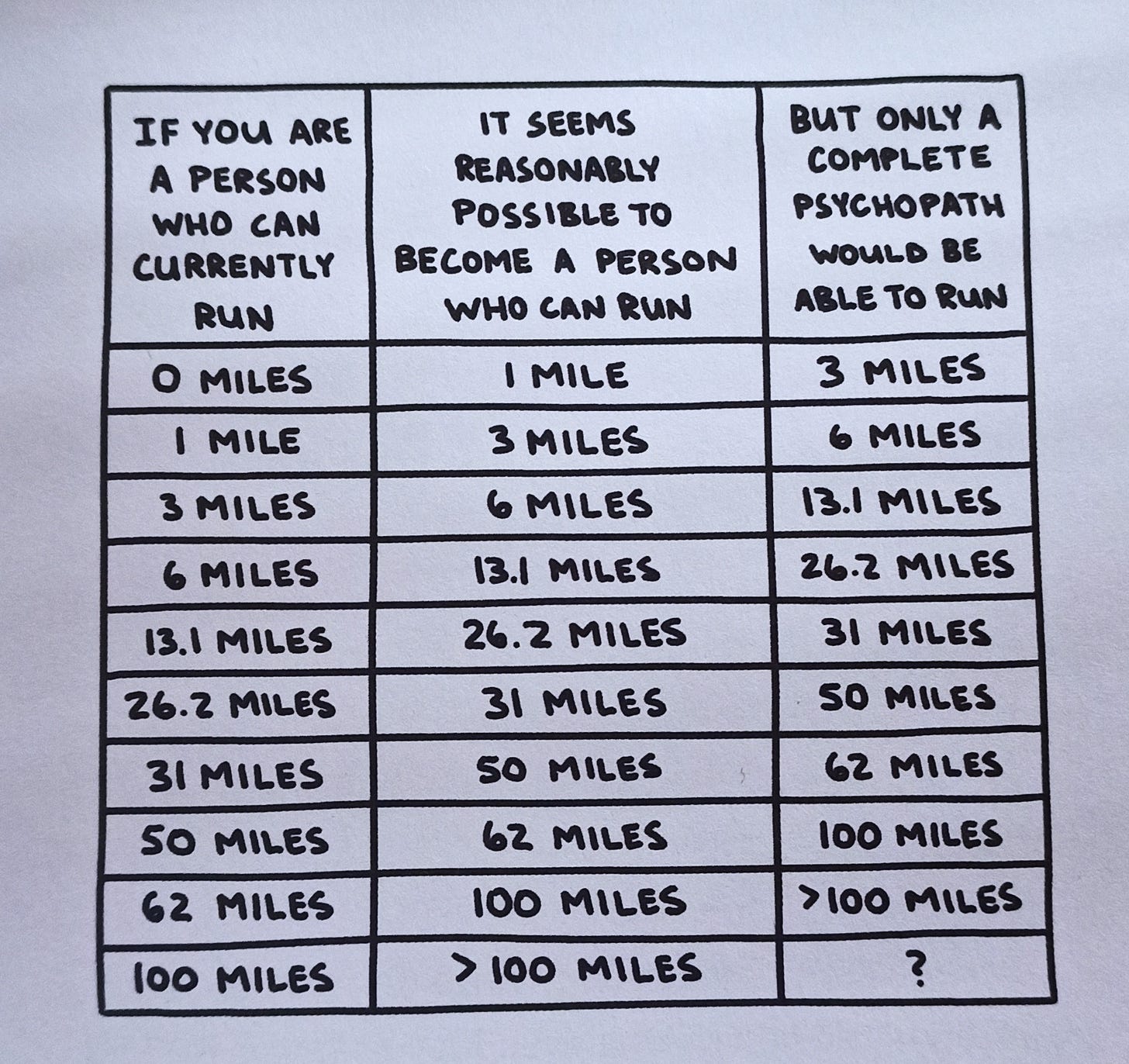Hello! This is Everything Is Amazing, a newsletter that pokes & prods at curiosity, attention, and the joy of doing things for no immediately apparent reason.
If none of that makes sense, start reading from here - or try subscribing below:
And if either of these doesn’t help, just look at the pictures instead. (It could make you feel seven years younger.)
Today, three curious things. Let’s start with the biggest, reddest one.
1) The Curious 10%
Last weekend I lost myself for a few hours in a National Geographic documentary about NASA’s Spirit Mars Exploration Rover. It’s an incredible story, and I couldn’t believe I didn’t know the details (some space-nerd I am, it turns out).
The rover’s mission plan was to survive for 3 months: no small feat in a place with an average temperature of -60 Celsius, with the nearest mechanic 34 million miles away. Anything achieved beyond those 90 days was a bonus - and that’s how the scientists tackled every single day of the mission. In the words of one of the scientists, they treated each day “as if it was their last.”
All very impressive and meme-worthy. But this strategy paid off to an incredible degree. The 90-day deadline came, but Spirit kept rolling onwards.
And then a hundred days passed.
Then two hundred.
Then they’d quadrupled the lifetime of the rover.
By this time, mechanical issues were creeping in at last. Specifically, the effect of Martian dust. It’s fine enough to be dangerous to humans (a 2002 study found it’s so reactive in contact with water that it may ravage the lungs of astronauts in the same way silicosis plagues miners) - but it’s absolutely fatal to rovers, which rely on solar energy to keep rolling. By day 400, a thick layer of dust had built up on Spirit’s solar panels, throttling their ability to suck up enough power to keep the rover moving and working.
Then this happened:
It’s a Martian dust-devil - and either this one, or one like it, swept over Spirit on the night of March 9th, 2005, blowing the dust off its solar panels and rocketing their efficiency back up to 93%. This “unexpected cleaning event,” as NASA puts it, increased the rover’s lifespan by at least another 300 days.
So the Spirit team did what many folk have done when they’re given a new lease of life: they went and climbed a mountain.
This is the view from Husband Hill, 350ft above the surrounding plains. Not much of a mountain by Mars standards (the biggest on the planet is 2.5x the height of Everest and as wide as France). For Spirit, though, this was a formidable challenge - which it overcame on day 582, after surviving more than six times longer than planned.
And then - Spirit just kept going. Day after day.
On March 22nd, 2010, after further adventures, mishaps and “cleaning events,” Spirit went silent at last. The rover’s 90-day mission had lasted more than 6 years - and like any great adventure, it happened because the people in charge said “hey, I’m curious - let’s do a bit more, and see what happens.”
(It’s certainly telling what NASA’s latest rover programme is called.)
‘Do A Bit More’ is an excellent way to motivate yourself. Take the above chart, from Brendan Leonard’s I Hate Running And You Can Too.
But it’s also great for your curiosity too, making it a double-whammy. Somewhat counter-intuitively, we’re most curious about the things we already know something about. Perhaps this is down to your brain’s obsession with the same thing Spirit depended on: conserving energy. If you already know something about a thing, some of that work is already done - and your mind, always looking for smart ways to invest its reserves of energy, yells “Woah, go back - yes. THAT. You should pay attention to that. Here’s a flood of dopamine to convince you I’m right.”
In this way, you could call it the “Curious 10%” - that incremental bit of progress that is most likely to get a green light from both your mind and your body. It’s also the most irresistible thing to you when you’re actually out there, doing the thing, approaching 100% done. What if I kept going - just for a bit longer?
At this point, the next bend in the road or the next hilltop become irresistibly interesting. Your daydreams back home prior to arrival may have latched onto bigger things, the call of the radically novel and the lifechangingly huge - but in the moment, that extra bit in front of you is everything - and is what will haunt you longest, if you back out now.
But if you don’t back out, if you accept this small, doable challenge, it’s guaranteed to keep you moving forward, even through fear and self-doubt, the killers of much bigger dreams…
It seems you can even use it to climb a mountain on another planet.
(If, like me, all this makes you curious about why nobody has invented self-cleaning solar panels - hey presto.)
(And staying with dazzlingly clever space-science, researchers have now identified the 1,715 stars from which curious aliens would have their best chance of spotting the Earth.)
2) “The Only Good Idea I Had Was To Hang On”
Yesterday, I finally learned the answer to a question that had bugged me every time I watched one of my favourite popcorn films, Raiders Of The Lost Ark:
“After Indy clambers onto the U-boat, why didn’t the bloody thing submerge and drown him?”
The answer is in this Twitter thread - and there’s even related footage that didn’t make it into the final film.
(It’s an interesting point that in real life, U-boats stayed on the surface: their speed and range were severely curtailed underwater while running on battery power. That’d be enough of an explanation to satisfy anyone - except the dialogue of the U-boat crew in the previous scene, spoken in German, included the line "dive the submarine!" Oh well.)
In learning all this, I quickly realised this explanation was pretty well-known. I’d been torturing myself unnecessarily, and could have Google-searched for an answer at any time. But I realised that every time I watched Raiders, I’d fallen into a pattern of behaviour:
i) Ugh. THIS AGAIN. It’s so STUPID. WHYYYYY.
ii) *Enjoys the remainder of the film so much that the memory of being irritated is completely driven out my mind*
What I should have done is immediately write it down somewhere, in large, angry letters. Then I could have returned to it later and had a proper think, or do what we all do these days, type it into Google. And that got me wondering what other momentarily irritating questions I’m not bothering to find the answers to, because I’m in too much of a hurry, the question seems stupid, or I’m just being lazy.
No longer:
(It’s small enough to fit into any pocket, so from now on, it’s going everywhere I go.)
I reckon this is another of those rules of curiosity: if a question’s interesting enough to bug you, it’s interesting enough to write down and find an answer to - no matter how foolish, inconsequential or fascinating-only-to-you the question seems.
If you’re as annoyable as I am, feel free to copy my example and join me here at the fringes of acceptable society.
(And if you’re a writer of any kind, keeping a notebook like this to capture your curiosity is vital, for all the reasons Britany Robinson lays out here.)
3) Keep ‘Em Coming
I recently asked you to send in a paragraph or two about a special nerdy thing you’d love to teach anyone who reads this newsletter. HUGE thanks to everyone who has done that (it’s nice to have confirmation that you’re all much nerdier than I gave you credit for). I’ll be publishing the first batch of these soon.
But if you haven’t sent anything in yet, give it a go! Here’s how it works:
“I’m giving you the opportunity to use my newsletter to teach, explain, enthuse wildly, geek out shamelessly about something. I’m giving you the mic - or more accurately, a brilliantly passionate couple of paragraph in an upcoming newsletter, sometime soon.
The aim here isn’t for you to provide me some vast, expertly detached overview of your chosen subject that tries to be the last word on the matter. Don’t do that. Don’t sum it all up. That’s what Wikipedia is for. No - the aim is to make everyone curious enough to want to know more. Give them the tiniest corner of it, but make it irresistibly tasty.
You could talk about what you do for a living, or a creative hobby, if you like. Feel free to self-promote, link included. But please, don’t do “an advert.” Adverts are usually very dull things. Adverts rarely make anyone curious. If it seems advert-like, you’re not making the reader feel it. Instead, make them feel it. Tell them a story, or paint a tiny picture with words, or make them laugh or drop their jaws to the ground in amazement…
Teach them not just what it means, but also how it feels.
You could submit something in the following ways:
send me 2-3 paragraphs about your thing by email, to hunter.sowden@gmail.com
leave a comment on the Web version of this post
have a short chat with me about it, using one of the calls I’ve been doing for the newsletter recently (which is how I know some of you are so ridiculously interesting)
put it in an Instagram post or Twitter thread, tagging me in each case (I’m here on Twitter, and here on the Insta)
do something I haven’t yet thought of. Semaphore? Interpretive dance? A Banksy-style mural? A drawn map? Surprise and confuse me. (It’s not hard, tbh.)
In the next issue of Everything is Amazing, I talk to the writer whose throwaway comment annoyed me so much that I started this whole newsletter to deal with it.
Thanks for reading!
- Mike
Images: NASA/JPL-Caltech/Cornell Univ., NASA/JPL-Caltech/USGS, Wokandapix









Oh I love this idea of the Curious 10% so much. Just keep pushing a little further into the unknown... brilliant.